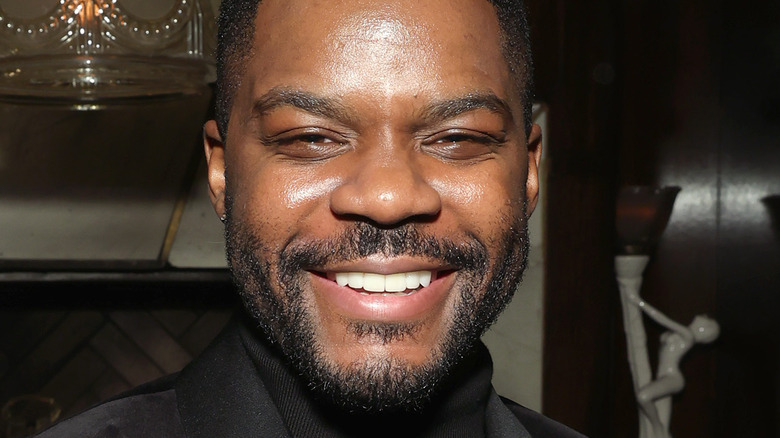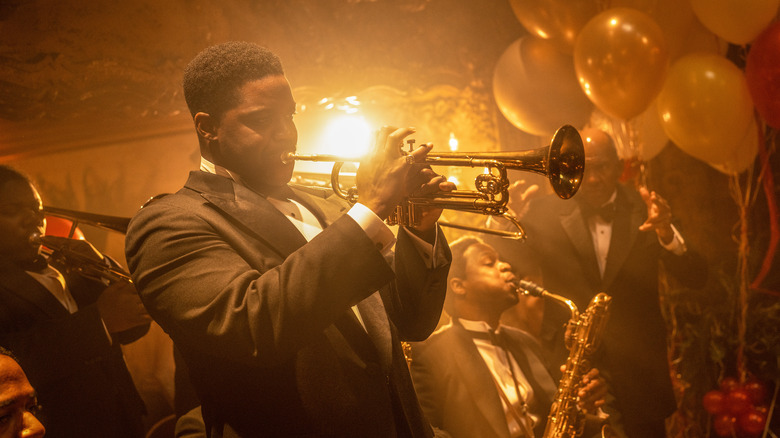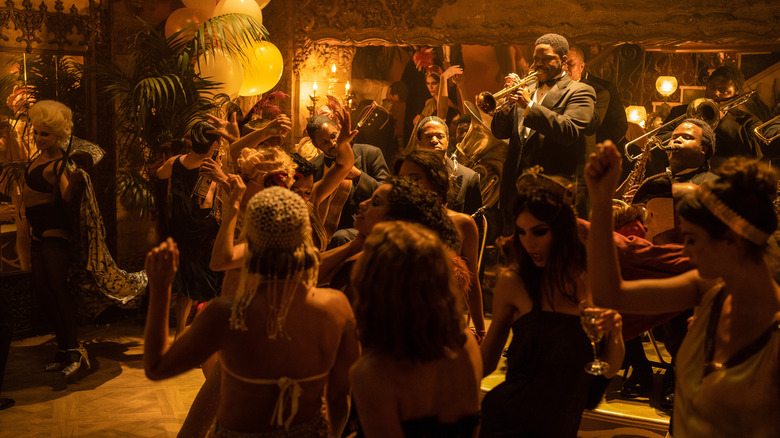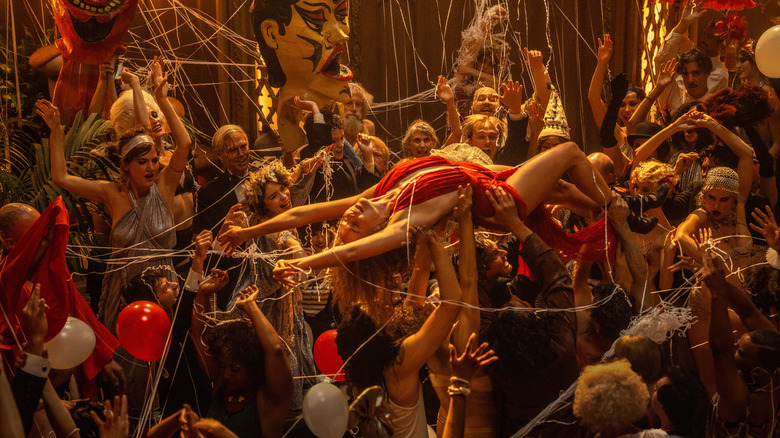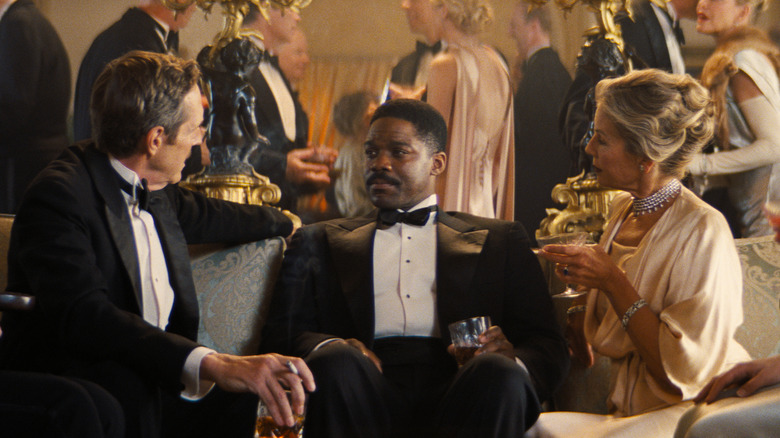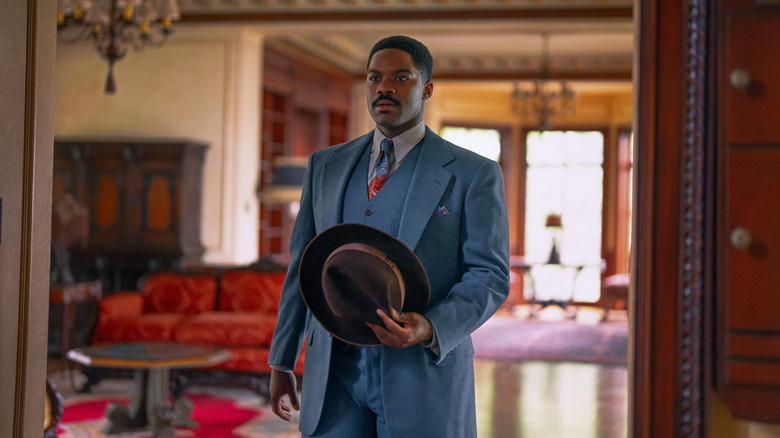Babylon's Jovan Adepo On The Movie's Music, History, And More - Exclusive Interview
Director-writer Damien Chazelle's new movie, "Babylon," is a massive three-hour epic set in 1920s Hollywood, just as the Golden Age of silent films was nearing its end and the advent of sound was about to revolutionize the industry. The film is both a celebration and a critique of Hollywood's penchant for excess and debauchery, at a time when much of Los Angeles was still dusty farmland and the studios operated as maverick creative operations instead of corporate content factories.
While the film focuses on characters played by Margot Robbie, Diego Calva, Brad Pitt, and Jean Smart — the former two looking to make their mark on Hollywood and the latter two already entrenched in its pervasively hedonistic culture — "Babylon" also highlights the struggles and triumphs of other personalities who carve out their place just adjacent to the main action.
One of those is Sidney Palmer, a virtuoso Black trumpet player who finds himself and his hot jazz ensemble performing at bacchanalian parties that make an ancient Roman banquet look like a quiet bowl of pasta at that local Italian place around the corner. When the arrival of sound also brings the rise of movie musicals, Sidney suddenly becomes a star of the screen — while still confronting the racism inherent in a business run firmly by white people.
Sidney is played by Jovan Adepo, who was last seen — as Larry Underwood, also a musician — in "The Stand," the 2020 miniseries based on Stephen King's bestseller. "He's witnessing this shift in the industry, where his talents are more valuable in front of the camera and he can change his lifestyle," Adepo tells Looper about Sidney's journey in "Babylon." "Then when he's a movie star, he ultimately ends up being challenged about something that he feels is questionable."
Adepo learned to play trumpet for the movie
Last year, we saw you play a musician in "The Stand," and now you're playing a musician in this film. Do you have musical training or background yourself? What instruments do you play, if any?
I was able to learn a bit of the guitar for "The Stand" and bass guitar just for pleasure. I didn't play the trumpet before this film. I did briefly when I was [in] middle school, but I definitely didn't stick with it. So this was an opportunity to get to pick up the instrument again and try to learn something new. It's cool to get to have different experiences on roles and learn new skills, so it was a good experience.
How extensive was the work you did to learn the trumpet for this film?
Pretty extensive, because when you're playing in middle school, you only play "Mary Had a Little Lamb" and those types of really easy songs.
I don't read sheet music, so what we had to do is develop a system where, as Justin Hurwitz was scoring the film, I was listening to a lot of the earlier demos of the tracks, and my trumpet coach, Dan Fornero — brilliant musician — he would dissect the notes on the sheet music by number, because the trumpet only has three valves, three buttons, that you can play. He would develop a number system. It almost looked like code. It's crazy. I would watch him play these songs, and I would try to commit it to memory just by watching him on video or in person. We did that for a few months, and I had to commit all of the songs that Sidney would be playing to memory.
The notes that you see me pressing on the valves are the correct notes in accordance [with] the songs that you're hearing, but it isn't quite my tone coming out of the horn. That's done in post, and Ludovic Louis was the trumpet player that gave us sound. Ludovic, of course, is a brilliant trumpet player himself. I was lucky to have Ludo on the film.
How director Damien Chazelle uses music in Babylon
Music is almost like another character in Damien's films, especially jazz in "Whiplash" and this and "La La Land." How do you think the music in this film defines the period that the movie is set in, and how do you think he uses music in a way that's different from other filmmakers?
It's very specific to this time because that was a time when music was ... Each of these genres were being mastered, and these artists were trailblazing in the genres that we've come to love today.
Damien has a very musical tone to how he tells stories. Even if you look at the scenes when there isn't a performance going on, there's a cadence to the dialogue. There's a rhythm in the way he cuts the scenes together as far as the coverage goes. That's a testament to his history and his background in music. It's something that he enjoys doing because it creates a rhythm and a pacing to the films, and it allows people to follow it and feel the music without always having to hear the music.
It's almost like you and the band that you're playing with in the early part of the film are a Greek chorus, in a way.
Totally. That's very well said. That's kind of how I always considered Sidney's arc in the movie as you see all of these wild parties and these wild scenarios with all the other characters. I'd like to imagine or compare it to a full album, and Sidney's storyline is more of the interludes that happen in between all of the tracks.
Keeping the party going
What was it like shooting those "Babylon" party scenes? There's so much energy that comes off the screen. How much of that is actually happening on the set, and how much is done with editing?
The editors did a brilliant job capturing all of the partying, but it was definitely what you saw in [the] film. I don't think there's a way you can fake that because it's not like we had CG background people. We had all practical, real background artists who were brilliant, and that kind of energy was exactly how it appears on-screen. It was surprising because we filmed that sequence for maybe 12 days and had plenty of rehearsals. All of the dancers, all of the background artists, all of the principal cast, everyone was [going] full tilt the entire time.
It was an energy that Damien created which was really cool. There were speakers in the theater that we were performing in, and in between takes, he would always blast music. After a really long take or a couple of hours [at] a certain camera angle, as they're changing setups, he would blast music like it was a fricking nightclub. So people were always finding that energy and getting amped up, and he would come in and get everybody hyped. It was a really cool atmosphere and a great way for him to control the energy in the room and get the takes that he needed.
How Adepo's character navigates fame and racism
What defines Sidney's character for you, and what leaped off the page about him?
Sidney was able to keep a strong sense of self or maybe recover his sense of self and be able to walk away from something that wasn't serving him in a positive way. It's a[n] interesting thing to witness. I consider Sidney more of a bystander of the moment, because when you first meet him, he's not searching to become a movie star or anything like that. He's on his night job; he's playing music with his band, what he's always done, and getting his chance when he can get it.
He's really lucky in that he's witnessing this shift in the industry, where his talents are more valuable in front of the camera and he can change his lifestyle. Then when he's a movie star, he ultimately ends up being challenged about something that he feels is questionable. And of course, he does it because he's guilted by somebody he would consider his friend, but after that, he's like, "I experienced all that I needed to in this moment. This is not worth the money and the toys, the cars and all that, perhaps isn't worth me losing my soul."
Even with the money and the toys and everything, the racism is still there.
Of course.
Were there any particular figures from the era that you looked at or talked about with Damien, in terms of artists who were successful but still had to deal with the bigotry of the time?
Yeah. Talking about Sidney was really fun, especially the initial conversations on the phone or at Damien's house. We spent a lot of time talking about that era as a whole because that was an era that I hadn't paid too much attention to in my own personal time, other than surface-level listening to some of the music. It was really refreshing. He gave me a book — I can't remember the title, but it was a collective conversation about Black artists at that time in Los Angeles and how they shifted and found themselves in front of the camera and became larger-scale musical stars as well as movie stars.
Curtis Mosby was one of the earlier influences that he brought up. Then you have the guys that probably are more household names, like Cab Calloway, Duke Ellington, Louis Armstrong — those type[s] of early pioneers of the genre that found themselves becoming movie stars and being able to be shot callers and more well-known. It was really cool that he allowed me to also pick and choose from a collection of people how Sidney would walk, how he would talk, how he would emote certain things, laugh, cry, whatever. I had freedom because Sidney wasn't solely based on one person. I was able to be flexible and pick what was useful for me.
Next stop for Adepo: The future
You're also going to be in "The Three-Body Problem," which is [set in] a whole different era — in this case, the far future. With the novel being hard science fiction, how are they managing to translate that to the screen and make it understandable for audiences?
[David] Benioff and [D.B.] Weiss had success with "Game of Thrones," and they're doing a great job [with this] of trying to make sure that people can understand the size and scale of everything, but they're also writing it in a way that people who are not familiar with physics or science are able to follow it. With all these projects, with "Three-Body," with "Babylon," it's about people, and that's what brings people [to] the seats. That's how you get them to care about the stories, because they care about the characters.
Benioff and Weiss did that with "Three-Body," and Damien did that with all the characters he introduces in "Babylon." It's all about getting the audiences to understand the circumstances that all of the characters are going through and getting them to care about their journeys. That's the mission, and when that show comes out sometime next year, I think they'll be able to do that effectively.
Fans and critics had mixed feelings about "The Stand," your last big miniseries. What's your sense now of how that turned out?
I can never have too much input on how things are received. As an actor, all I can do is pursue projects or characters that are interesting to me. If I believe in the general direction or the vibe that the creators or the filmmakers have for it, that's where it starts for me. Every actor in any project does their best to elevate what's on the page and bring it to the screen. Then you never know how fans will take anything, especially because tastes are always evolving and shifting. You try to make the best art you can and you throw it out there, and people might catch it or they might toss it. That's all you can do.
"Babylon" is out in theaters on Friday, December 23.
This interview has been edited for clarity.
